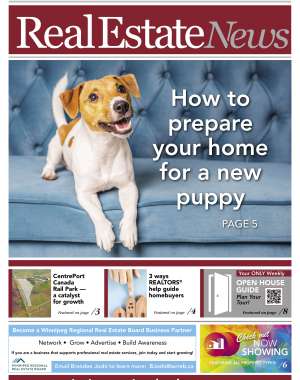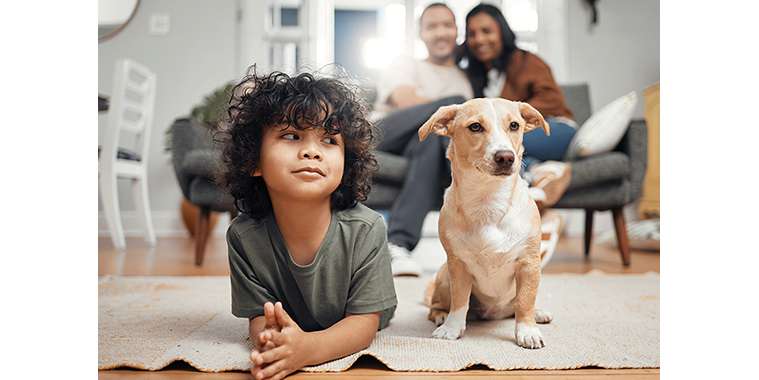The entire month of May is National Pet Month, so what better way to celebrate than to bring home a rescue dog? So many are waiting for their forever homes and you could make one very happy.
Or you may have already found the perfect furry friend to bring home. But be prepared! Your world is about to change in the best way as flapping ears, a wagging tail, and a droopy tongue become your new normal.
Before bringing home your new puppy or dog, there are important changes to make to ensure your pet is safe and happy in its new space, and that your home doesn’t get completely destroyed!
Flooring
When it comes to floors and dogs, hardwood and carpet both have their pros and cons. Hardwood is good because it’s easy to clean paw marks, accidents, and shedding fur. The downside to hardwood is it can be easily scratched by long nails. Waxing floors often, clipping pet nails, and taking long walks with your puppy can help extend the life of your hardwood.
Of course, it’s not practical to completely redo your flooring from hardwood to carpet once you get a dog. However, opting for area rugs or carpet runners in high-activity areas could be a nice compromise.
With any carpet, whether it’s wall-to-wall or area rugs, be prepared to quickly clean any accidents with special cleaning solutions and odour eliminators. Accidents are going to happen, but cleaning a mess properly can make or break a repeat performance. Dogs will revisit spots where they smell their own urine, so be sure to clean the fibres well with a mixture of vinegar and baking soda and, if you can help it, don’t let the mess sit!
Plants
Understanding your dog’s habits is important when it comes to managing your plants. If they’re the curious type who often stick their noses in places they shouldn’t, you’ll want to put your plants on a shelf or hang them in a basket. In addition to just making a mess, your dog getting into your houseplants could be dangerous. There are common houseplants that can be toxic to pets, including aloe vera, jade, lilies, and the popular Philodendron (a Monstera look-alike).
For those who don’t want to skip the houseplants, but still keep things safe, pet-friendly plants include Boston ferns, succulents, inch, and spider plants.
If you’re an animal and plant lover, these are some changes worth making to help your little paw-tner be protected and safe.
Garbage area
To any pup, the smell of a garbage bin can be fascinating — not to mention an open invitation for rummaging. Whether in the kitchen or bathroom, your bin likely contains harmful contents such as spoiled food, plastics, hygiene products, and tons of choking hazards. Keep your dog out with a covered trash can that lives in a cabinet or is elevated.
Moreover, take precautions and bring harmful trash, compost and recycling immediately outside to the bin or throw it down the garbage chute. In addition to chocolate, there are many foods that can be harmful to your dog if ingested, such as Macadamia nuts, onions and chives, avocado, corn on the cob, grapes and raisins, and nutmeg.
Create a cozy zone
Before picking up your pup, consider dedicating an area of your home as its own “zone”. This space will allow you to supervise your dog’s movements and behaviours as they get used to their new surroundings. Whether it’s a crate or playpen, an area where your dog can play and keep themselves occupied is necessary. Consider putting up a pen or a gate, and throw in some pee pads, toys and cozy bedding.
As your dog gets used to its surroundings, you can remove the pen and just add gates to help keep your pet away from off-limit spaces. This progression will help your dog feel happy and confident as they get used to their new home.
Yard
Your new pup will likely spend a lot of their time outside. A fence is a clear way to help your dog stay out of external danger. Make sure they can’t slip through the bars or burrow their way underneath.
Like indoor plants, there are some outdoor plants you should watch out for that can be dangerous to dogs. Things like tulips, lilies of the valley and rhododendrons can be toxic to dogs when ingested, so keep a close eye on your new pupper if any of these are in your garden. It’s a good idea to keep your pet off grass treated with fertilizer and/or pesticides, too.
To prevent ticks and fleas, keep your lawn properly manicured, try to avoid long grass, and check their fur regularly.
Dog-proofing your home protects your property from long-term damage and your dog from getting into any unnecessary trouble. If you’re thinking of renovating with pets, keep in mind what types of floors would go well with your pup. If you’re a plant lover or outdoor enthusiast, keep a look out for toxic plants and chemicals that your puppy may consume.
As you get to know each other, keep a lookout for patterns in their behaviour and continue to change your environment accordingly.
Puppy-proofing not only helps you in the present, but in the future, as it could draw in buyers looking for a pet-friendly home. If you’re looking for a new home and already own a pet, a REALTOR® will be able to help you find the perfect home for both you and your fur-baby.
— Realtor.ca



